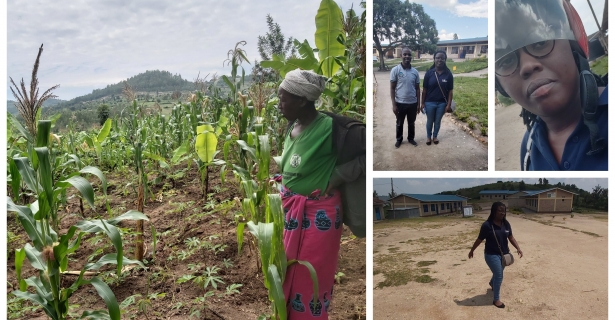This winter break, I was fortunate to travel back to Rwanda to continue supporting my initiative, To The Waters. To The Waters tackles issues related to unsafe water, sanitation, hygiene, nutrition (WASH-N), and poverty in low-income communities and schools using innovation and entrepreneurship. We believe WASH-N is a right of all human beings, but access to improved WASH-N most of the times is not possible due to its costs, which is why we tackle poverty as well.
To The Waters started in November 2018 at Tufts University, and we currently operate in the southern province of Rwanda. One of the initiatives To The Waters is interested in is the use of human waste in agriculture. On this trip, I wanted to understand how farmers in the Mbuye sector of Ruhango perceive the use of human waste in agriculture. Mbuye sector is a rural area region composed of 62 villages with approximately 41,000 residents.
The first part of my trip to Rwanda consisted of speaking to agricultural advisors in nine villages that I chose based on my previous baseline survey I conducted as part of the Laidlaw and research scholars’ program. I visited to each of the nine agricultural advisors and conducted a short informal interview, which consisted of questions about types of plants they cultivate, whether they sell their produce commercially, if they have cooperatives of farmers, type of fertilizers they use and where they get them, whether they use human waste in their agriculture, and key challenges they face in their agricultural careers.
In general, these villages mostly cultivate cassava, maize, and beans. Only Rubona, Kanyinya, and Karama-Mwendo villages clearly sell their harvest commercially, sometimes through cooperatives. Karama in Gisanga, Kanyinya, and Kabungo do not have farmers operating in groups. Agricultural advisors reported that farmers use urea, DAP fertilizers, organic compost, and sometimes human waste in their fields. These visits reveal how the government helps farmers afford industrial fertilizers via a platform called SMART Nkunganire. This platform enables farmers to register for buying agricultural products at lower prices. Also, agricultural advisors reported that farmers use human waste when their toilets are full. They mostly apply it on plantain trees and not directly on plants because it usually burns the plants. Generally, challenges reported by these representative agricultural advisors included lack of markets for their harvest, especially for maize; agricultural products sold at farther locations; climatic conditions; and more.
These visits revealed something to me. Human waste is already used in agricultural activities in rural areas. However, it may be used when it is still harmful to apply on plants such as when it has not been composted well to kill all microbes. Thus, in the future, To The Waters might pursue an initiative of providing technical training for farmers on how to successfully compost human waste and apply it to plants. Most farmers that I spoke to said that human waste almost functions like chemical fertilizer, which means that if it is applied well, it can boost harvests. In addition, as an entrepreneurially driven person, I saw the lack of market for farmers’ harvests as a business opportunity. This can help farmers sell their produce at a good price, which enhances their standards of living for them and their families. I am personally interested in how I can be part of this solution to empower farmers as well as to fight against food insecurity that can be observed during severe climatic conditions.

